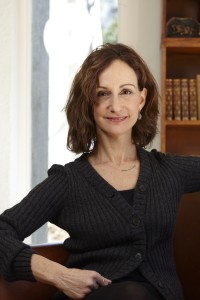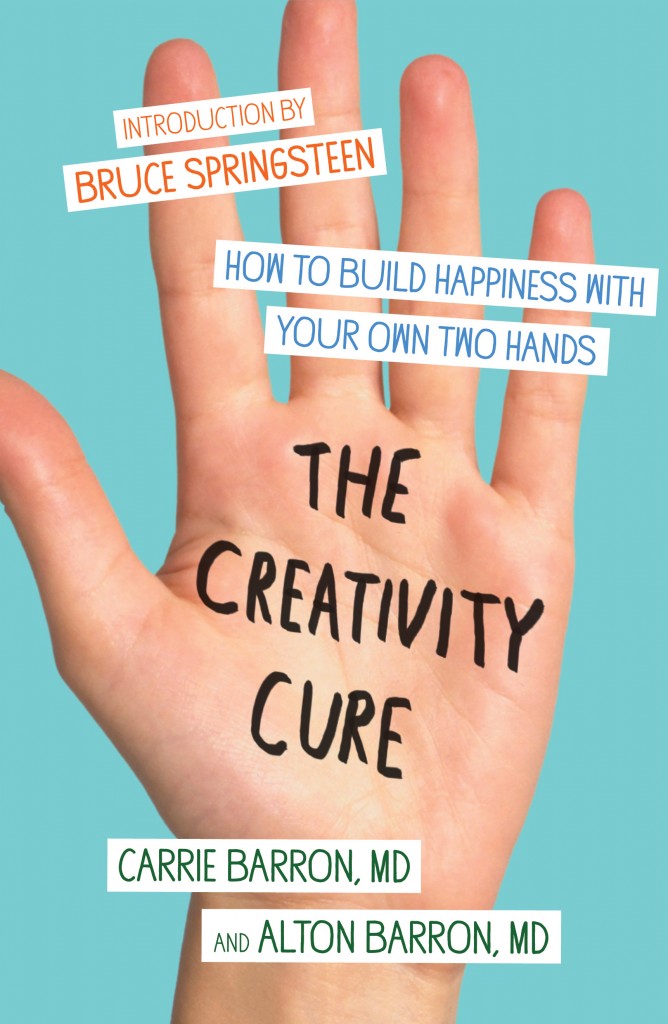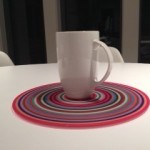Tea for Creatives: Carrie Barron has a Creativity Cure
 In The Creativity Cure: How to Build Happiness With Your Own Two Hands, husband-and-wife physicians Carrie and Alton Barron reveal that creative action is integral to fueling long-term happiness and wellbeing. Creativity as cure sounds the complete opposite from what we often read about great artists—and what so many people today experience: bouts of anxiety and depression. In this week’s Tea for Creatives interview, Carrie Barron, M.D. shares her insights on why, and how creativity is a cure for what ails.
In The Creativity Cure: How to Build Happiness With Your Own Two Hands, husband-and-wife physicians Carrie and Alton Barron reveal that creative action is integral to fueling long-term happiness and wellbeing. Creativity as cure sounds the complete opposite from what we often read about great artists—and what so many people today experience: bouts of anxiety and depression. In this week’s Tea for Creatives interview, Carrie Barron, M.D. shares her insights on why, and how creativity is a cure for what ails.
“The need to create – to produce something using our minds and hands – is fundamental. It connects us to our inner selves and to our environment and offers the deep satisfaction of accomplishment,” Carries says. But too often, in our technology driven, fast-paced society, we neglect this need. In The Creativity Cure, the Barrons show that creative processes facilitate insight and healing, connect our mental and physical selves, supply satisfaction and meaning, and bring about life changing results.
 The five steps of The Creativity Cure—Insight, Movement, Mind Rest, Using Your Own Two Hands, and Mind Shift—lead the way to a more meaningful, fulfilling life by simultaneously developing self-understanding and self-expression. The Barrons’ detailed tools and strategies for cultivating creative outlets and overcoming unconscious fears and barriers have helped thousands of people experience—and learn how to sustain—the deep satisfaction that accompanies creating something by hand.
The five steps of The Creativity Cure—Insight, Movement, Mind Rest, Using Your Own Two Hands, and Mind Shift—lead the way to a more meaningful, fulfilling life by simultaneously developing self-understanding and self-expression. The Barrons’ detailed tools and strategies for cultivating creative outlets and overcoming unconscious fears and barriers have helped thousands of people experience—and learn how to sustain—the deep satisfaction that accompanies creating something by hand.
Carrie Barron, M.D has presented original works related to creativity and self-expression at national conferences, in peer-reviewed journals and she has taught at numerous clinical and psycho-spiritual centers in the U.S. She is a board-certified psychiatrist/psychoanalyst on the clinical faculty of the Columbia College of Physicians and Surgeons. She maintains a private practice in New York City and teaches at the Hudson Valley Writer’s Center and en*theos academy. Carrie has a popular blog at Psychology Today.
Thanks, Carrie, for sharing your keen insights and your own creative challenges—and cures—with us!
What are the key aspects of The Creativity Cure?
Our Five Part Prescription: Insight (Self-Knowledge), Movement (Exercise), Mind Rest (Unplug, Do Nothing), Your Own Two Hands (Make Things), and Mind Shift (Take Yourself to a Positive Place) is lifestyle medicine. It also teaches people how to uncover and develop creative capacity, which is important for meaning and happiness. Creativity has been called the natural antidepressant, so the prescription leads to optimal moments and a better day-to-day experience. Proper self-care leads to stronger, more generative and generous individuals.
What is the relationship between creativity and spirituality? Why is it important?
Creativity and spirituality stem from similar states of mind. When one reaches a deeply private place within the self, the internal life, one is connecting to higher things. It can create a sense of stillness; peace with a dose of excitement as there is a sense of being on the right path. Whether you are convening with a higher power, an inner figure who gives you light and hope or with beautiful ideas, it can be a euphoric experience. One exults.
What role does creativity play in personal wellbeing and healing?
As Willa Cather said, “That is happiness, to be dissolved into something complete and great.” When we are involved in a task that is so absorbing that we lose a sense of time, we experience Flow, one of the best experiences life has to offer. Creativity can provide peak moments but also better ways to pass the day. If we are engaged in a meaningful activity, we feel better about living. Joyce Carol Oates talked how just “the act of writing” can create a profound shift in her mood. Also, for many people, self-expression through whatever form works for them – prose, painting, song or movement, cuisine or design– is essential for working through problems and pain.
What’s interesting about this discussion is that many artists deal with creative anxiety at all stages in the creative process. Yet, you’re promoting creativity as a pathway for healing. How can creativity be both source of anxiety and the cure for it?
Yes, this is an interesting issue. There are many stages to the creative process; some involve a letting go, some a reining in. There is divergent and convergent thinking. If we feel blocked, apprehensive about how our product will be received, frustrated by what feels like an unsolvable problem, we can feel anxious and depressed. The trick is to teach yourself to have tolerance for these uncomfortable phases, move through them with trust and patience until you get to the idea that grabs, holds and guides you through. When you reach that place, agitations and stresses decrease and a more balanced, positive view can ensue. Absorption in a project that interests you can be an antidote for oppressive states of mind.
Describe the biggest creative obstacle you’ve faced? How did you work through it?
I have writing blocks at times. After prolific periods, for whatever reason- distractions, deadlines, children’s needs, I stop. If I go for more than a few days without writing, the whole system recedes into a kind of shutdown. My solution is to not let more that two days go by without writing something, even if it is random and inconsequential. Sometimes writing by hand, often with a cup of tea within reach, as soon as I get up in the morning helps as the physicality of it transitions me to a deeper place. It feels more primal and therefore stirs things up in a good way. Another approach is to write out the psychological clutter—the worries, concerns, pre-occupations—on a piece of paper and then toss it so you can get to more interesting things. Or in the end, I just have to sit myself down and say, “No choice, get going.” Life will intervene and stop your flow so you have to expect it. And have methods for getting back on track.
Where do you find inspiration to sustain your own creative process?
Inspiration comes from surprising places. A person on the subway, a conversation in a grocery store, a line in a story, someone’s face, an act of kindness, a beautiful setting, or an object. It is a matter of being receptive I think, rather than seeking. Also, creativity can be the way out of a struggle, so if something is awry I write about it and often feel lighter.
What quote best serves as your mantra on creativity?
Psychoanalyst and pediatrician D.W. Winnicott said, “It is creative apperception more than anything else that makes life worth living.” Whether is what we make or what we make happen, engagement is the essence of a good life.
I also love this quote by Henry James, “When [a man] has fair health, a fair fortune, a tidy conscience and a complete exemption from embarrassing relations, I suppose he is bound, in delicacy, to write himself happy.” It is really about finding what you can do and want to do and taking it seriously as well as getting away from people or situations that hold you back.
 Favorite tea cup?
Favorite tea cup?
Last week, my mother-in-law gave me a cup of hot tea in a long slender white cup with leaves, an elf and squiggles. It had a certain whimsy and optimism that was cheering. When I am home it is just a large, plain white cup from Target! I love the shape and the simplicity.
Do you have a ritual for preparing tea?
Sometimes before I go to sleep I will sit on the living room couch, stare across the room at my kid’s instruments and drink decaf chai with milk, which seems to have soporific features.
What is you favorite Possibiliteas tea? Why?
Claritea appeals to me as it represents balance and alertness and I love rosemary.
Anything else you’d like to share with our readers?
Creative engagement can have a profound impact on both health and happiness. I cover many topics on my Psychology Today Blog and in my en*theos academy lectures which people may find helpful. My next book will delve more deeply into matters of creativity and health. In the meantime, visit us on Facebook for some interesting links and thoughts.
Events: Carrie and Alton Barron will be speaking at Vogue Knitting in Chicago in the fall.
Tags: anxiety, art, artistic process, artists, Carrie Barron, Creative Anxiety, creative process, creativity, depression, health, spirituality, tea, tea wellness, The Creativity Cure, well being
Trackback from your site.
